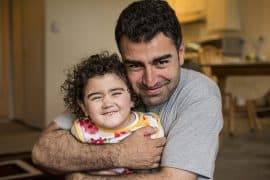How the Seattle Clemency Project is trying to reform criminal justice
written by Chad Walsh
For all Gary Thomas knew, he was going to die in prison. Before he was an inmate and a ward of Washington, Thomas was an artist. He’d also been an addict. To pay for his heroin addiction, he robbed a store in the 1970s. He did it again in the 1980s. He was caught—and sentenced—both times.
In 1998, Thomas’s addiction was so severe that he spent a week robbing banks—without a disguise and without a weapon. But something had happened between that second robbery and his last string of robberies—the voters of Washington became the first collective community to adopt a “three strikes” law. Thomas’s third felony essentially sentenced him to die in prison, because, unlike California, which passed a similar law the following year, Washington doesn’t have parole. Washington does, however, have a clemency and pardoning board. That’s why, in 2016, Thomas penned a last-ditch letter to Seattle criminal defense attorney Jon Zulauf.
Zulauf was moved by Thomas’s story. In prison, Thomas kicked his habit. He also returned to art, painting a mural at the prison that jailed him. Visiting wardens admired the work so much that Thomas was frequently farmed out to other wardens throughout the state to paint murals for their prisons. Thomas was seemingly rehabilitated. He’d served two decades. He was 70 years old. He walked with a cane. Why, Zulauf thought, should he remain a prisoner?
Zulauf was mulling over Thomas’s story at a downtown cafe near his office when his friend and colleague, attorney Jennifer Smith, dropped by for a quick caffeine boost. He shared the letter. She shared his sentiments. Soon, the two decided they would not only take on Thomas as a pro bono client, but they’d do the same for others who’d been given de facto life sentences because of that three-strikes law—and they’d do so under the banner of the Seattle Clemency Project, an attorney-led, volunteer-run organization designed to help all the non-violent lifers the system gobbled up. According to Smith, the Seattle Clemency Project has matched eighty-four clemency applicants with volunteer lawyers. So far, thirty-two clemency petitions have been led. Six people have been granted early release. Three are presently free, including Kenny Wyatt, who now sits on the project’s board, and Dwight Griffin, who was released in August.
But Thomas was the first to win his freedom, when Governor Jay Inslee granted him clemency on December 21, 2017. According to Emily Zulauf, the project’s original co-executive director, current board member and Zulauf ’s daughter, Thomas is doing well. He lives at a drug treatment facility in Seattle and has just completed his first months of residency, which means he’s been granted outside privileges. And he has support, Emily Zulauf said. He’s using an old friend’s garage as an art studio. Just this summer, Circa, a restaurant in the Admiral District, became the first local business to showcase Thomas’s artwork.






